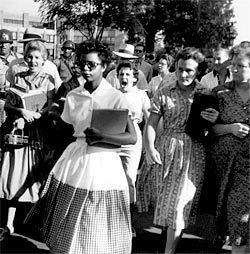The Brown v Board trial was a court case about the desegregation of schools. This case was argued under the 14th amendment because these schools were not equal therefore, they did not live up to the separate but equal law created by Plessy v Ferguson. Many people saw this as the court’s way to reverse the effects of the extremely poor decision of the Plessy v Ferguson case and end the separate but equal law. I think both teams for the mock trial did a great job at gathering good points and information for and against the trial, however, I found this case interesting because I feel my views on this case changed based on the education system that we see for minorities today.
Originally when I first learned of the case it seemed obvious that schools should be integrated. Schools were not equal; clearly, black students were given less than 1/3 of the same accommodations as white students. However now we get to see the effects of Brown v Board, especially my personally attending a PWI (Predominantly White Institution) and I find myself agreeing with the other side of the argument concerning comfortability or social norms and representation. If we were to look past the fact that schools were not equally funded and instead created equal would there still be an argument?
During the trial, representation was a topic that was slightly mentioned but not brought up enough. From my viewpoint, I’ve seen my dad’s impact as an elementary teacher at a Guilford County Public School. Being a black male teacher has a significant impact on all the students not only the ones that he teaches. The students can see an educated black man and feel comfortable around him because of their mutual respect and understanding. Students of all grades go to him to seek advice because they think their white teachers would not understand their dialect, home life, or background.
For example, there was a student that did not want to go to gym class because they were going to be playing outside. The white teacher did not understand why and tried to force the student to go to the gym. However, the student went to speak to my dad and explained the reasoning was that he was wearing his new shoes and was not allowed to get them dirty. Since this is common in African American households my dad immediately understood and allowed the student to stay behind in his classroom. While it may seem simple and insignificant small understandings like this matter so much at a young age.

Therefore, I can’t imagine in the 1950’s being taught by a white teacher that refused to even see an African American as a person learning a little black child in their formative years. While not all teachers may have not been negative, I guarantee that some teachers refused to teach black students or taught black students extremely unfairly due to the belief that black students were just unable to learn anything at all.
Aside from the representation of teachers, there’s also the representation of your fellow peers. This a problem we still see heavily mention in today’s schooling system. As said during the mock trial Black people make up only 12% of the American population. This means during the time of the trial while attending school African American children will be surrounded by children that were taught to hate them. Even today it can be extremely uncomfortable for African American students to be the only person of color in an all-white class.
However, I still agree with the decision of Brown v Board mainly due to the concept of a marketplace of ideas. Being separated from people that look different than us or think differently from us puts society into a box, we never stop to think that there could be something of value in learning from someone else. Integrated schools help to end racism and biases in the younger generation. For younger kids’ school is one of the only places they have to develop their beliefs and values of the world outside of their parents, therefore children can realize the biases their parents instilled in them are not true. This creates a new generation of people that can communicate effectively with each other because they were no longer separated by biases forced on them by their parents.
Additional Links










No comments:
Post a Comment